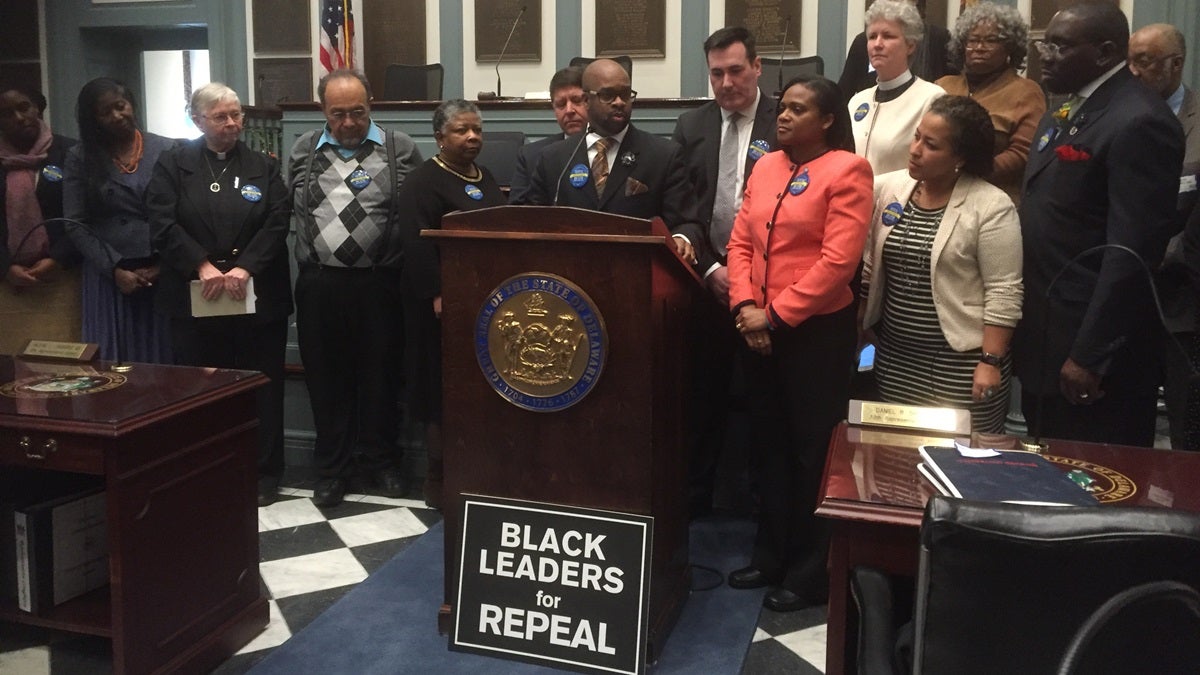More support for ending Delaware’s death penalty

Rev. Donald Morton, executive director of the Complexities of Color Coalition, and others, expressed their support of the death penalty repeal during a press conference in Dover on Wednesday. (Zoe Read/WHYY)
Civil rights, religious leaders, and politicians, joined in Legislative Hall in Dover Wednesday to express their support of the death penalty repeal in Delaware—to be voted on Thursday.
The Complexities of Color Coalition, NAACP Delaware State Conference, Interdenominational Ministers Action Council of Delaware, Delaware Latino Restorative Justice Project and others addressed racial inequalities within the state’s criminal justice system, particularly at it pertains to the death penalty.
“We arrest too much, we incarcerate too much and we execute too many,” Executive Director of the Complexities of Color Coalition, Dr. Donald Morton said.
Senate Bill 40, sponsored by Sen. Karen Peterson, D-Stanton, and Rep. Sean Lynn, D-Dover, would repeal Delaware’s statute allowing for capital punishment in first-degree murder cases, with an exemption for inmates currently on death row. If passed, it will become the 20th state to repeal the death penalty.
The bill was heard in the House Judiciary Committee last spring, but failed to secure enough votes to be released to the full House. Rep. Larry Mitchell, who voted against releasing the bill last year, recently signed SB 40 out of committee with an “unfavorable” endorsement, allowing the bill to move forward.
Lynn said capital punishment depends largely on race—he also said the sanction is unconstitutional.
“According to the Constitution no one can be subject to cruel and unusual punishment,” he said. “It is never acceptable to kill the wrong man for the right reason.”
According to the NAACP’s Legal Defense and Education Fund, 42 percent of death row inmates are African Americans. In addition, 156 individuals have been exonerated from death row and more than 50 percent of those were African American.
In Delaware, African American defendants who have allegedly killed white victims are six times more likely to be convicted to the death penalty than African Americans who have allegedly killed African Americans, according to the organization.
“The numbers are atrocious across the board,” said Angel Harris, a staff attorney with the NAACP’s Legal Defense and Educational Fund, which has been fighting for repeal of the death penalty since the ‘60s.
“It’s very clear this is not the way we should be handling as some people call ‘the worst of the worst’ and we have to have a more humanitarian approach to this.”
Rev. Jack Sullivan Jr. of the Murder Victims’ Families for Reconciliation was one of the speakers at Wednesday’s event who has suffered the loss of a loved one to homicide.
He said taking revenge on the alleged murderer is not the right answer. Sullivan said instead there should be more services available to victims, such as counseling.
“On behalf of thousands who have lost loved ones to murder…murdering those convicted of murdering our loved ones does not provide closure,” he said. “Execute no one in our names.”
Morton said if the legislation doesn’t pass on Thursday his organization will keep fighting until the death penalty is repealed.
“We need to pay particular attention to the fact that we need to participate in our own liberation, and I believe it starts here,” he said.
WHYY is your source for fact-based, in-depth journalism and information. As a nonprofit organization, we rely on financial support from readers like you. Please give today.





